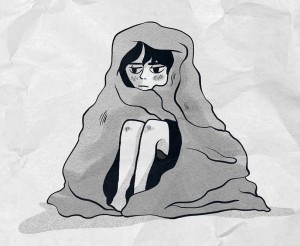The Japanese have developed a mobile booth for social phobes
 Many programmers do not leave home for several days in a row (see survey results ). For example, recently one programmer in Kazan Innopolis didn’t leave a dorm out of a hostel for a month . There is no problem in this: the work is done from home, the money goes to the card, and sometimes it is even cheaper to buy products with free home delivery than in the store.
Many programmers do not leave home for several days in a row (see survey results ). For example, recently one programmer in Kazan Innopolis didn’t leave a dorm out of a hostel for a month . There is no problem in this: the work is done from home, the money goes to the card, and sometimes it is even cheaper to buy products with free home delivery than in the store.
There are some people who do not leave the house for another reason. Not because they do not feel this need, as programmers, but because they experience inconvenience. They feel some kind of irrational fear from public speaking. Their behavior changes if someone observes them. They feel uncomfortable if a passer-by on the street looks at them, if teenagers are laughing nearby (“Do they laugh at me?”). Even in a big company, such people feel lonely. These are typical signs of social phobia - anxiety disorder, which became widespread in the 21st century.
Scientists estimate that in our time about 20% of the world's population suffer from social phobia at one time or another, with varying intensity.
Some experts express the opinion that modern digital technologies - computers, smartphones, the Internet - reduce the number of interpersonal contacts and live communication, thereby simplifying living conditions in social isolation. It turns out a strange paradox: the technologies that were invented to improve communications — e-mail, chat rooms, social networks, the same cellular communication — actually reduce the amount of live communication between people and stimulate social phobia.
One of the most technological countries in the world - Japan - suffers from the problem more than others. It is not surprising that an unusual invention appeared in this country: the Mobile Personal Space (MPS) mobile social booth developed at the State University of Gifu.
The authors Kazunori Terada and Tomohito Hara recently presented their invention at the IEEE / RSJ International Conference on Intelligent Robots and Systems.

Mobile booth is a robotic shell that surrounds a person from all sides, reliably protects his personal space from people, and the person himself - from prying eyes. When you are inside the booth, you communicate with others only through cameras and LCD screens. You no longer have to sweat from fear, looking into a person’s eyes and have a terrible desire to run away somewhere. In such a booth a person feels completely calm and safe.
This is not just a toy. For some patients with autism spectrum disorders, such personal robots can be prescribed by a doctor. People with such diseases show symptoms of a persistent lack of ability to initiate and maintain social interaction and social connections, as well as limited interests and often repetitive behavioral actions.
MPS allows you to freely navigate the area. The shell inside the perimeter is equipped with surveillance cameras. It is enough to take a step in any direction, the cabin will immediately react - and also move in this direction. Movement in any direction is implemented using omnidirectional wheels.

Now, in the experimental sample, only one screen is installed inside the cabin, but according to the designer’s idea, LCD screens should cover the walls around the perimeter and provide all-round visibility. Similarly, the walls can be equipped with screens outside the cabin around the perimeter.
Cameras and screens not only shield physical contact with the outside world, they can transform it for the observer from the inside, that is, provide a kind of augmented reality. For example, she can present the interlocutor in the form of an animated avatar in an anime style to reduce the stress of communicating with a real person face to face.
Maybe the Mobile Personal Space booth will not help rehabilitate a social phobia, but it should at least create comfortable living conditions in this world.
True, one of the developers, Kazunori Terada, said in his speech at the conference that the first experiments on the use of MPS on real patients brought a “not very good” result. Even when placed in a booth, social phobes talked about the feeling of stiffness, fear of people and the feeling of sadness when talking to other people. On the other hand, scientists note that the number of phrases spoken during a conversation from a booth at a social phobia has doubled compared to a normal conversation. So it may well be that the booth does help them in some way.
All Articles